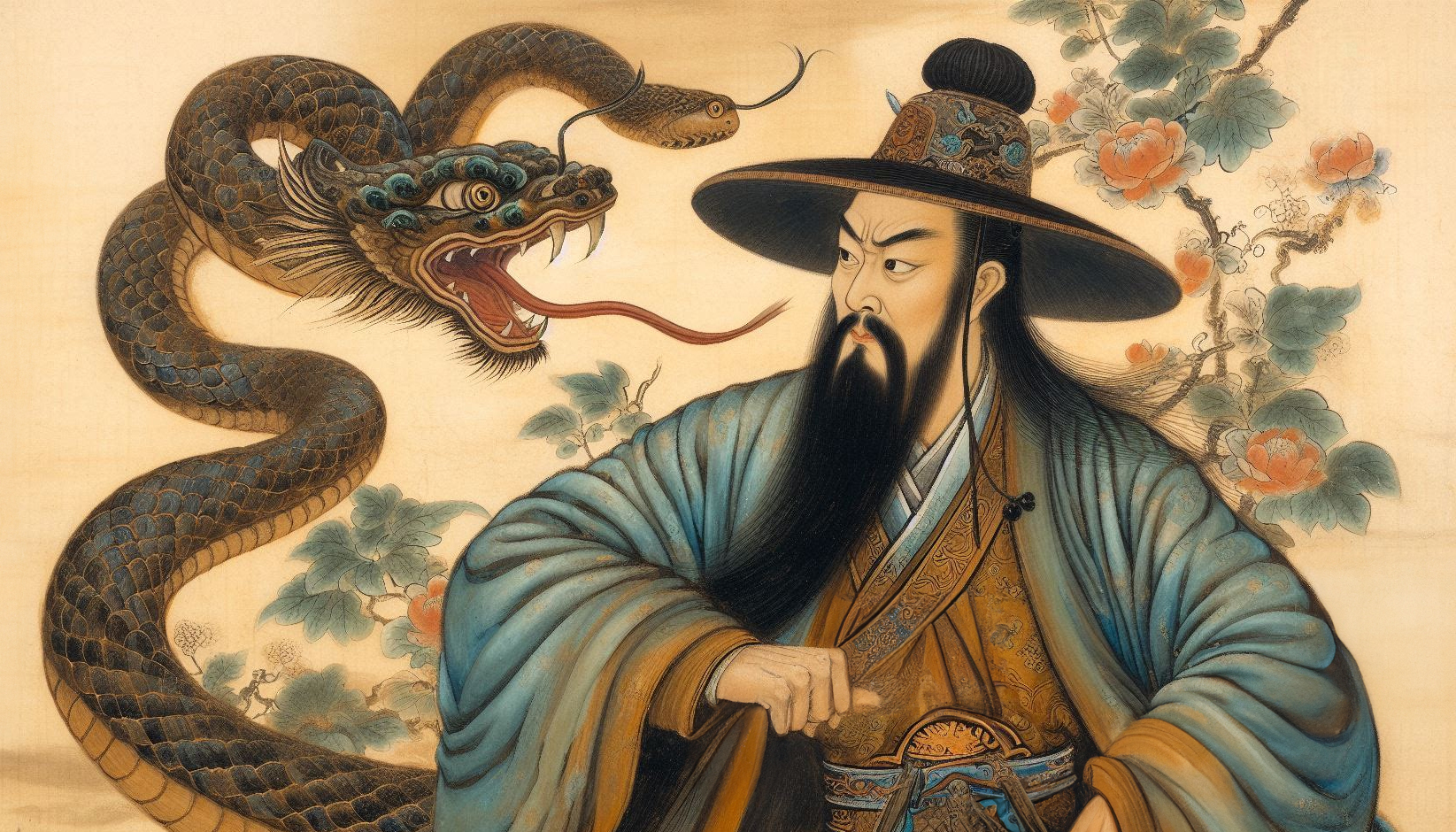Translated By Tara Lau
Fang Xiaoru (1357-1402), a hero of the Ming dynasty (1368-1644), once helped Emperor Taizu, named Zhu Yuanzhang, gain the throne. After the emperor’s death, he assisted Emperor Hui to continue to govern the nation. Being a member of the Imperial Academy, he was a man of great learning and was renowned for his loyalty and filial piety. However, according to Ming history, the fate of this heavy-weight faithful courtier was to become very tragic.
In the fourth year of Emperor Hui’s Jianwen reign, Zhu Di, the Prince of Yan, who was stationed in Peking at the time, attacked the capital city Nanjing, seized the throne and named himself emperor. Fang refused to draft an edict for the prince’s ascendence to the throne as decreed, and was executed for this reason. Not only so, the prince annihilated his entire clan. This bloody persecution is known in history as an “execution by association on the vine”, meaning that the victims were arrested and executed through association like fruit along the one vine.
Fang may have been the only person in Chinese history ever punished by executing all those in the clan including his fourth-degree relatives. Why would someone so loyal and righteous have suffered such atrocity?
Karmic reward and retribution, involving one’s lives of the past, present, and future, are complex with intricate layers and hard to gauge with common sense.
A good cause planted in this life may not be able to yield a good reward soon, as its good karma may not have sufficient time yet to mature and thus shall wait for an occasion to arrive. In contrast, given all necessary conditions, an evil cause planted in a past life may render its retribution in this life. This is called “Goodness gets a reward and evil gets a retribution. If there is no consequence yet, the hour has simply not come”. Fang’s virtue in loyalty and filial piety, of course, would have far-reaching merits in future, but it is alleged that the punishment he suffered of having his entire clan decimated was due to an ancestor’s wanton but unwarranted killing of living beings.
Before his birth, Fang’s father had chosen a plot of land to build a grave for the reburial of their ancestors. On the eve of the ground breaking, the father, an esquire, had a dream. An old man dressed in red bowed to him and begged, “Benevolent Man, the location you’ve chosen is the home where I have lived for more than 200 years. I beg you to delay your building work for three days, so my children and grandchildren have time to move out, before you start digging. I promise to repay you for your great kindness and mercy.” The old man in red reiterated his request sincerely and respectfully, before departing with another bow.
When he woke up, the esquire decided that the dream he had had was a phantom illusion not to be believed. Besides, he had already selected the auspicious day to break ground. Why should he wait for another three days? Thus, he gave instruction to start work right away. Unexpectedly, however, as they dug to a depth of ten feet underground, the workers found a cave filled with hundreds of red snakes, and they set them on fire and burned them all to death. That night, the gentleman dreamed again of the old man in red, who was now in grief and full of resentment, and said sobbing, “Last night I earnestly begged you for a three-day grace so I could remove my family. Little did I expect such cruelty from you by burning to death all my 873 children and grandchildren! Since you’ve had the heart to wipe out my clan, I will also obliterate yours!”
Later, when the country esquire’s wife gave birth, their son, to be named Xiaoru, had a pointed tongue like a snake’s. He grew up to be a man of outstanding talent, loyalty and filial piety, and occupied a high-ranking post as Member of the Imperial Academy and Attendant Tutor to Emperor Taizu. After the emperor died, the Prince of Yan attempted to take the throne from his nephew, the succeeding Emperor Hui, by sending his troops south into Nanjing to capture the capital city, where all the civil servants and military officers surrendered with the exception of Fang, who declared he would rather die than give in. The prince ordered Fang to draft an edict for him that would proclaim to the nation, “The Prince of Yan has moved into Nanjing with the military to protect the sacred land of the Dynasty”. Yet, regarding the prince to be a rebel insurgent, Fang wrote down these words instead, “The Thief of Yan has usurped the throne”. This greatly enraged the prince, who threatened, “Aren’t you scared I could destroy all your family including its nine kinship?” Fang countered with indignation, “Not at all scared, not even if you included all the ‘ten’ kinship of my family!” This further infuriated the prince, “All right then! I will exterminate all your family including its ‘ten’ kinship as you wish!” In established penalization by kinsfolk extermination, there had only been the nine-relations at its maximum. How could there be ten kinship? But in desperation, the Prince of Yan decided to count all of Fang’s students and teachers as his “tenth” kin in the execution.
Legend has it that Fang was born as an incarnation of the old man in red. What had happened prior was of course that his father had burned to death all of the old man’s children and grandchildren in the form of 873 red snakes, and Fang’s execution was to include all the conventional nine relations of family and relatives plus all of his teachers and students, whom tallied exactly 873 in total. With reward and retribution, Karma is undeniably accurate to a hair’s breadth.

